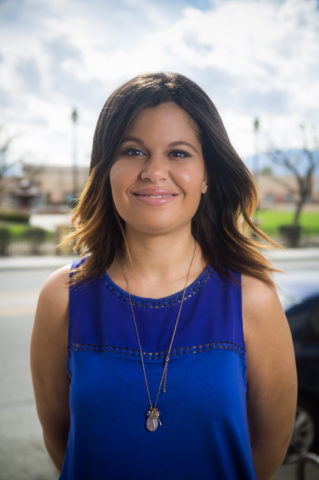
Above: Vicente Rodriguez and Olivia Vaquera stand outside their home in Thermal, Calif. (Image: Olivia Rodriguez/Coachella Unincorporated)
By Paulina Rojas
THERMAL, Calif. — Like many immigrants, Vicente Rodriguez and his wife Olivia Vaquera came to the United States with the intention of learning English. But lack of access to English learning resources in their new home made this a challenge.
“When we first arrived to the U.S from Mexico, we wanted to start learning English right away,” Rodriguez said in Spanish.
Rodriguez wanted to continue his teaching career and started attending a few English classes. But his job as a farmworker left him exhausted and without much time to pursue his studies.
The pair didn’t have many options when it came to English classes that would fit their busy schedule.They attended classes on and off, learning a few things here and there but never reaching the level that they wanted to.
“Farm work really takes a toll on you and doesn’t leave you with much energy to do anything else,” said Vaquera in Spanish.
“We started attending classes but then we started getting tired from work and we stopped going, and then after a while we would sign up for classes again,” Rodriguez said.
At the time, the couple, who live in Thermal, had to drive a minimum of 30 minutes to attend classes at the adult school in Coachella or at the College of The Desert campus in Indio.
“Farm work really takes a toll on you and doesn’t leave you with much energy to do anything else,”
Even though that was over 20 years ago, they say that not much has changed.
Advocates from the Eastern Coachella Valley and throughout the state agree that access to English learning resources remains a barrier for people in rural communities.
In response, organizations like the Farmworker Institute for Education and Leadership Development (FIELD) are trying to provide English classes that meet the needs of farmworkers.
“(There’s) not a lot of economic opportunities in rural areas; it is a lot of labor-intensive agriculture,” said David Villarino, president and CEO of FIELD, which offers English classes in rural communities throughout California, from the Coachella Valley to the Central Valley. They serve an average of 12,000 farmworkers per day.
According to Villarino, the success of FIELD English courses can be attributed to the fact that classes are offered seven days a week as part of a six-week program. This consistency, along with the guidance of bilingual teachers, helps keep students engaged.
Advocates say they are now seeing more people interested in enrolling in English classes as a response to an increasingly hostile political climate.
“What is happening at the national level is creating a greater consciousness,” said Luz Gallegos, community programs director at the TODEC Legal Center.
TODEC offers ESL and ESL Civics courses in the Eastern Coachella Valley and throughout other parts of Riverside County. The civics course is geared to help those who are in the process of obtaining their citizenship.
There are currently 300 people on the waiting list for TODEC’s ESL and ESL civics courses.
“The main reason (there aren’t more English classes) is funding; our counties are overlooked,” said Gallegos.
TODEC opened an office in Coachella in February to be able meet the needs of the community.
“As we continue to elevate the community voice, they’re able to get better jobs,” she said. “It’s a win-win for the local community and for the state.”
Abel Guzman, program manager of Adult Education at Bakersfield College-Delano Campus agrees that basic English proficiency is crucial to achieving financial mobility.
He said that often people who live in rural farmworker communities don’t feel a pressing need to learn English because they can usually get by on Spanish in these areas.
“(Learning English) is the foundation to higher education or getting into the workforce,” he said. “They’ve been working in the fields for 20 to 30 years and sometimes (not knowing English) is the only thing keeping them from getting the mayordomo (foreman) job.”
Bakersfield College-Delano has hired a full-time ESL instructor to better serve the Delano community.
“Previously, we only had adjuncts working in the program,” Guzman said.
To encourage students to transition from the adult school to college courses, Guzman and his team have intensified their recruiting efforts, targeting students in the higher level ESL courses at the adult school.
“We are working on making them comfortable. They are scared to take a college class; a lot of them are older and intimidated about being on a college campus,” he said.
“They’ll ask, ‘What if we fail?’ We let them know that we have tutoring services specifically to provide them support. Hopefully (we’ll) get them all to cross over.”
This kind of investment is something that Vaquera says she would like to see in her community in Thermal.
“If there were classes that were more accessible to us, I think it would be a lot better,” she said. “It would be beneficial if classes were offered later in the day and if there were more flexibility in the schedule.”
About the Author:
 Paulina Rojas is a native New Yorker, Paulina has spent the past two years reporting on the Eastern Coachella Valley. She joined Coachella Unincorporated in 2016. While it is different from the concrete jungle of Manhattan, she feels right at home in Coachella. In 2014 Paulina graduated with a journalism degree from The University of Houston and is a member of The National Association of Hispanic Journalists. View her author page here.
Paulina Rojas is a native New Yorker, Paulina has spent the past two years reporting on the Eastern Coachella Valley. She joined Coachella Unincorporated in 2016. While it is different from the concrete jungle of Manhattan, she feels right at home in Coachella. In 2014 Paulina graduated with a journalism degree from The University of Houston and is a member of The National Association of Hispanic Journalists. View her author page here.